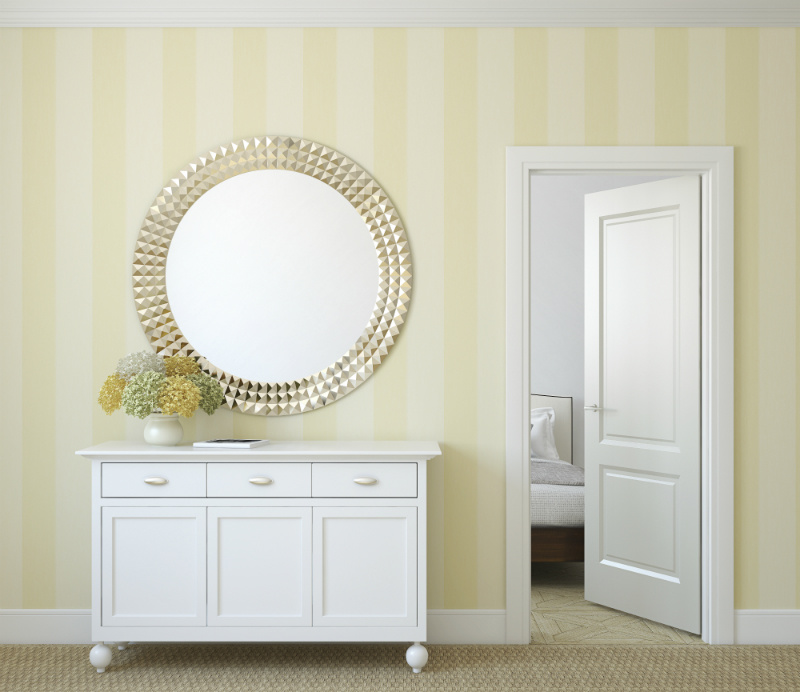To understand the effect of closing and opening interior doors on overall HVAC energy efficiency, one must first understand how the entire heating, cooling and ventilation process works.
Although it may seem logical that closing the door of a room would increase energy efficiency, since cooled air won’t dissipate to other areas of a home that need not be cooled, this is not the case in centralized HVAC systems. HVAC systems rely on air movement to keep the temperature and humidity within a certain area at levels that are comfortable for those inside.
In cooling systems, warm air inside your home is cooled in the units and the moisture content is reduced in order to lower humidity. The heat from this air, as well as excess moisture, is forced outside while the cooled air is blown inside to circulate the area. As air flows within an area, warm air is constantly cooled and its moisture gets reduced, while cool air is continuously blown inward.
In a building with numerous points of interior separation, impediments like closed doors can stop the continuous flow of air. This builds up pressure in certain areas and forces cooled air to escape outside through nooks and crannies, thereby inducing the cooling and ventilation system to exert more energy just to maintain the area’s temperature.
As air escapes from confined quarters, following the laws of pressure, air must also be drawn in. All this air does not come from your HVAC system. Some come from spaces found in windows. Others come from chimneys and outside vents. This unfiltered air brings with it spores, dust and moisture that can cause numerous complications.

We all know that doors can’t stay open all the time. A great alternative would be to install ventilation panels between rooms that would reduce the amount of air being blocked by a closed door. Also, raising the door a few centimeters can allow air to pass underneath and reduce the pressure buildup in a room. But perhaps the best way to avoid any complications that can come from closing off interior areas in a building cooled by a centralized HVAC system is proper prior planning and correct setup.
If you found this information helpful, keep following our blog for more helpful air quality and HVAC tips and info.
Frequently Asked Questions about HVAC Systems
1. How does closing interior doors affect HVAC efficiency?
Closing interior doors can actually reduce HVAC efficiency in centralized systems. It disrupts the continuous airflow needed for effective heating and cooling, causing pressure imbalances. This forces the system to work harder, increasing energy consumption and costs. It’s better to allow air to circulate freely or install ventilation panels to mitigate pressure buildup.
2. What is the impact of pressure buildup in an HVAC system?
Pressure buildup in an HVAC system can force cooled or heated air to escape through gaps and cracks, making the system work harder to maintain desired temperatures. This not only increases energy consumption but also introduces unfiltered air from outside, potentially bringing in pollutants and allergens. Maintaining balanced airflow is crucial for efficiency.
3. Can closed doors affect indoor air quality?
Yes, closed doors can negatively impact indoor air quality by preventing proper ventilation. This can lead to the accumulation of dust, moisture, and other contaminants. Ensuring good airflow by keeping doors slightly open or installing ventilation panels can help maintain healthier indoor air by allowing the HVAC system to effectively filter and circulate air.
4. How can I improve airflow without compromising privacy?
To improve airflow while maintaining privacy, consider installing ventilation grilles or raising doors slightly to allow air to pass underneath. These modifications can help maintain proper air circulation and prevent pressure imbalances in your HVAC system, ensuring efficient operation without sacrificing privacy.
5. What are the signs of an inefficient HVAC system?
Signs of an inefficient HVAC system include uneven temperatures, frequent cycling, increased energy bills, and poor indoor air quality. If you notice these issues, it may indicate that your system is struggling due to poor airflow or pressure imbalances caused by closed doors or blocked vents. Regular maintenance and proper ventilation can help improve efficiency.
6. How does an HVAC system maintain humidity levels?
HVAC systems regulate humidity by removing excess moisture from the air during the cooling process. This is achieved through the refrigeration cycle, where warm, moist air is cooled, and the moisture is condensed and removed. Proper humidity control is essential for comfort and preventing mold growth.
7. What are the benefits of proper HVAC ventilation?
Proper HVAC ventilation improves indoor air quality by removing pollutants, controlling humidity, and ensuring a continuous supply of fresh air. This helps create a healthier living environment, reduces the risk of respiratory issues, and enhances overall comfort. Effective ventilation also supports the efficient operation of heating and cooling systems.
8. How often should HVAC filters be replaced?
HVAC filters should be replaced every 1-3 months, depending on usage and the presence of pets or allergies. Regularly changing filters helps maintain airflow, improve indoor air quality, and ensure efficient system operation. Clogged filters can restrict airflow, forcing the system to work harder and increasing energy consumption.
9. What are common HVAC maintenance tasks?
Common HVAC maintenance tasks include replacing filters, cleaning ducts and vents, checking for refrigerant leaks, inspecting and cleaning coils, and ensuring the outdoor unit is free of debris. Regular maintenance can extend the lifespan of your system, improve efficiency, and prevent costly repairs. Annual professional check-ups are also recommended.
10. How can I reduce my HVAC energy costs?
To reduce HVAC energy costs, ensure regular maintenance, use programmable thermostats, and improve home insulation. Additionally, keep vents and ducts clean, seal leaks, and consider upgrading to energy-efficient models. Implementing these measures can significantly lower energy consumption and utility bills while maintaining comfort.


